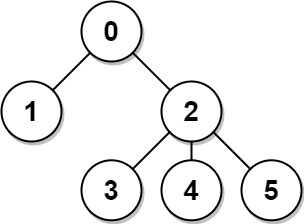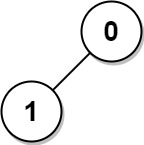There is an undirected connected tree with n nodes labeled from 0 to n - 1 and n - 1 edges.
You are given the integer n and the array edges where edges[i] = [ai, bi] indicates that there is an edge between nodes ai and bi in the tree.
Return an array answer of length n where answer[i] is the sum of the distances between the ith node in the tree and all other nodes.
Example 1:
Input: n = 6, edges = [[0,1],[0,2],[2,3],[2,4],[2,5]] Output: [8,12,6,10,10,10] Explanation: The tree is shown above. We can see that dist(0,1) + dist(0,2) + dist(0,3) + dist(0,4) + dist(0,5) equals 1 + 1 + 2 + 2 + 2 = 8. Hence, answer[0] = 8, and so on.
Example 2:
Input: n = 1, edges = [] Output: [0]
Example 3:
Input: n = 2, edges = [[1,0]] Output: [1,1]
Constraints:
1 <= n <= 3 * 104edges.length == n - 1edges[i].length == 20 <= ai, bi < nai != bi- The given input represents a valid tree.
[Tree] [Depth-First Search] [Graph] [Dynamic Programming]
- Distribute Coins in Binary Tree (Medium)


